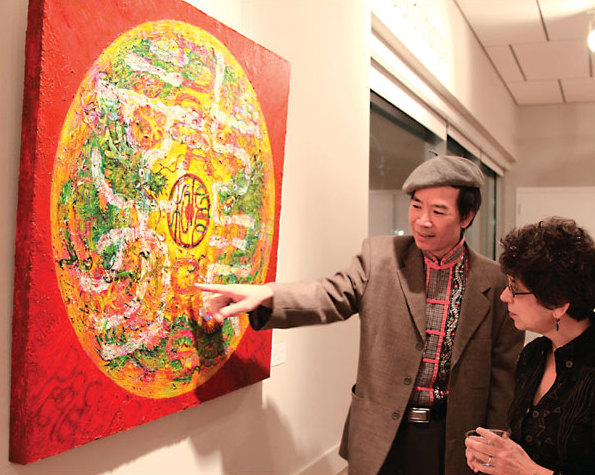 |
|
Huang Shanye explains details of his painting to Michele Cohen, curator of the hosting Betty Mae Kramer Gallery. Cai Chunying / China Daily
|
As many Chinese overseas artists are changing to other more lucrative lines of work, Huang Shanye, a painter of the Zhuang ethnic group in China, stands out as an exception. As his art has gradually earned him fame over the course of his more than 20 years in the United States, he has even been able to leave behind his steady job as an art teacher and fully devote himself to what he describes as a pursuit of beauty.
The common theme of Huang's many works lies in the combination of traditional Chinese elements and Western painting techniques. "I apply Chinese calligraphy, paper cutting, facial makeup of Peking Opera, embroidery - all the things that I can find in traditional Chinese culture - to Western oil painting," Huang said at an exhibition recently held in his home county of Montgomery, Maryland, where friends and neighbors had come to view some of his masterpieces.
One of Huang's works in the show, which had been featured on the exhibition's flier, served as a good example. Titled In Harmony, the painting shows two green dragons facing one another on a golden plate - a motif characteristic of Chinese imperial tradition. Huang decorated the surface with the words "peace" and "dragon", both in Chinese calligraphy and in English. The red background was made from English and Chinese language newspaper pulp with international headlines showing through.
Michele Cohen, curator of the Betty Mae Kramer Gallery, which hosted the exhibit, said she was delighted when Huang applied to be part of the show.
Pointing to Huang's In Harmony, Cohen said, "I felt like this work really illustrated how an artist can merge one tradition with another, and it really came out in a hybrid form," adding that Huang's work perfectly showcases the theme of the exhibition's title Cultural Exchange, which brings together the work of nine local artists, all from different artistic traditions and each trying to traverse cultural divides.
Louise Wilson, Huang's friend and an admirer of his work, was there to show her support. Wilson said she was deeply drawn to Huang's painting when she 8 rst saw it. As an art collector, Wilson visited Huang's studio earlier this year and has since bought four of his paintings.
A highlight of Huang's career was when one of his paintings was adapted into a ballet piece four years ago. In 1998, American composer Silas Huff met Huang at an exhibition and was moved by Huang's sketch of Tapestry of Dreams, which was later realized into a large-scale work consisting of a dozen 3-by-3-foot panels of paintings depicting the traditions and longings of Huang's people.
Inspired by the work, Huff composed a 25-minute symphony, Spring Song Festival, comprised of Chinese folk melodies. Ten years later when Huff and Huang reconnected, Huff was able to bring two ballet schools on board and create a ballet based on the symphony. The work was performed at LaGuardia Performing Art Center in New York in the spring of 2009, with Huang's Tapestry of Dreams as backdrop.
Huang now aspires to reach out to more domestic Chinese art lovers. Last year, he was invited to take part in an exhibition of overseas Chinese artists at the National Museum of China co-organized by the China Federation of Literary and Art Circles, the All-China Federation of Returned Overseas Chinese, the China Artists Association and the China Calligraphers Association.
"Among the works of the more than 100 participating painters, mine ended up winning the top prize," said Huang. Before coming to the US, Huang had already shown in China, so he was very delighted to learn that some of the people at last year's exhibit remembered him.
We recommend:
